Clinical Leadership and Management: A Comprehensive Report
VerifiedAdded on 2020/12/09
|8
|1950
|279
Report
AI Summary
This report delves into the multifaceted realm of clinical leadership and management, synthesizing insights from four research articles to offer a comprehensive overview. It begins by defining leadership and its crucial role in guiding healthcare teams to achieve desired outcomes, particularly in nursing and clinical practices. The report examines the perspectives of health professionals on clinical leadership, emphasizing the significance of effective leadership in implementing clinical changes and ensuring quality health services. It explores various leadership styles, including transactional and transformational approaches, highlighting their respective strengths in monitoring performance and fostering team coordination. Furthermore, the report addresses the challenges faced by clinical leaders, such as maintaining quality through innovation and promoting consumer partnerships. It also discusses key issues affecting nurse leaders, including budget considerations, resource management, and quality assurance. The conclusion underscores the importance of adopting suitable clinical leadership approaches to enhance service delivery and decision-making in healthcare settings.
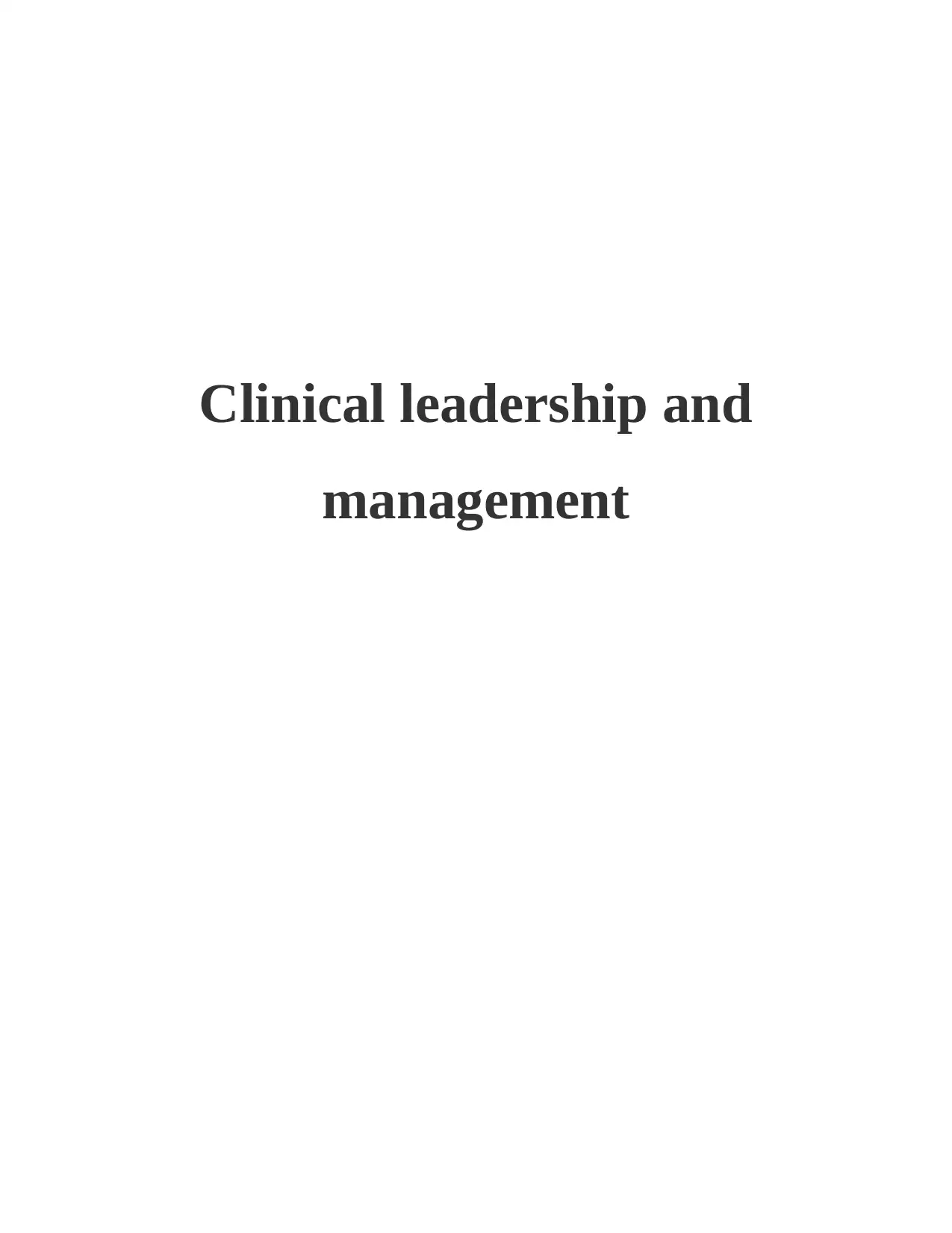
Clinical leadership and
management
management
Paraphrase This Document
Need a fresh take? Get an instant paraphrase of this document with our AI Paraphraser
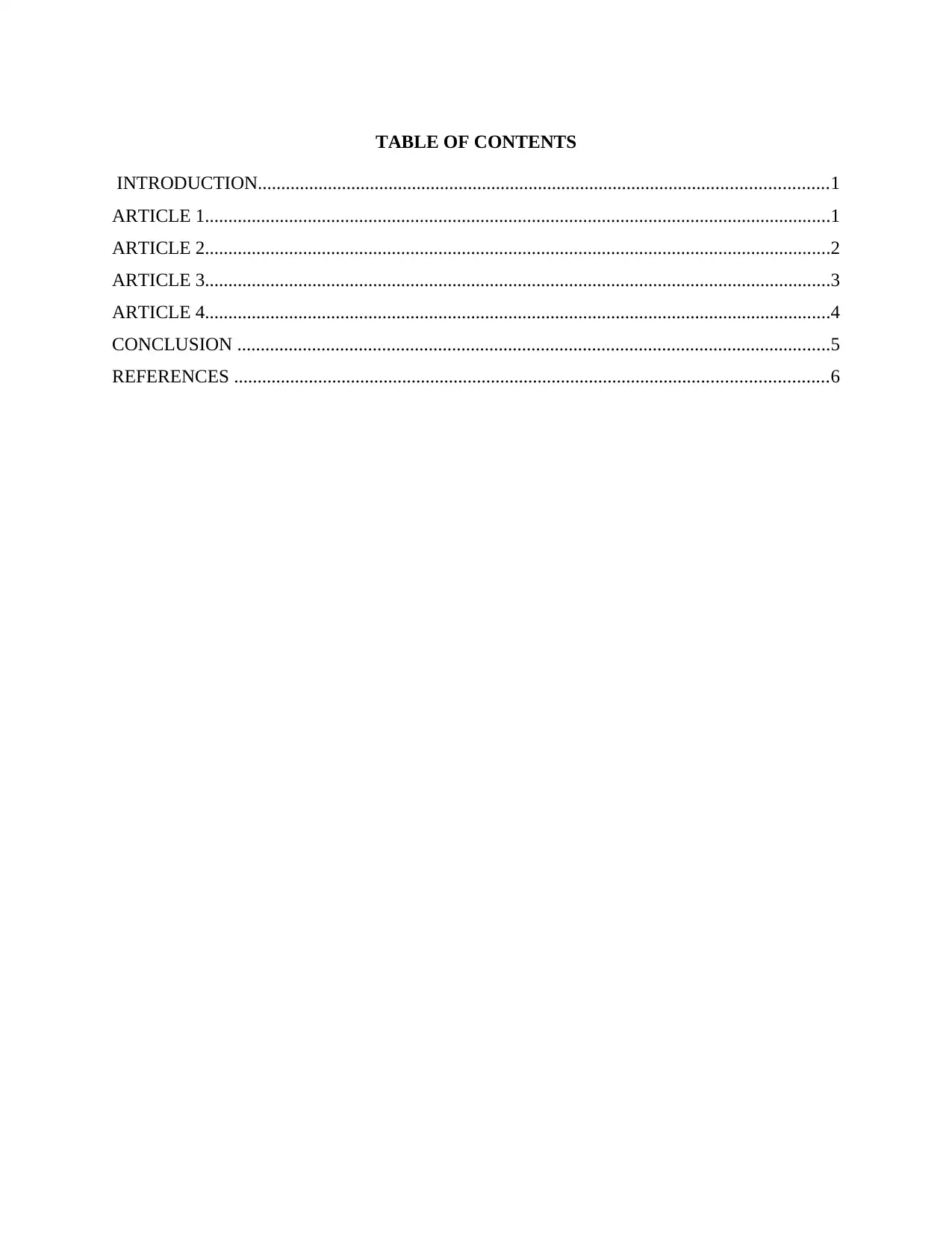
TABLE OF CONTENTS
INTRODUCTION..........................................................................................................................1
ARTICLE 1......................................................................................................................................1
ARTICLE 2......................................................................................................................................2
ARTICLE 3......................................................................................................................................3
ARTICLE 4......................................................................................................................................4
CONCLUSION ...............................................................................................................................5
REFERENCES ...............................................................................................................................6
INTRODUCTION..........................................................................................................................1
ARTICLE 1......................................................................................................................................1
ARTICLE 2......................................................................................................................................2
ARTICLE 3......................................................................................................................................3
ARTICLE 4......................................................................................................................................4
CONCLUSION ...............................................................................................................................5
REFERENCES ...............................................................................................................................6
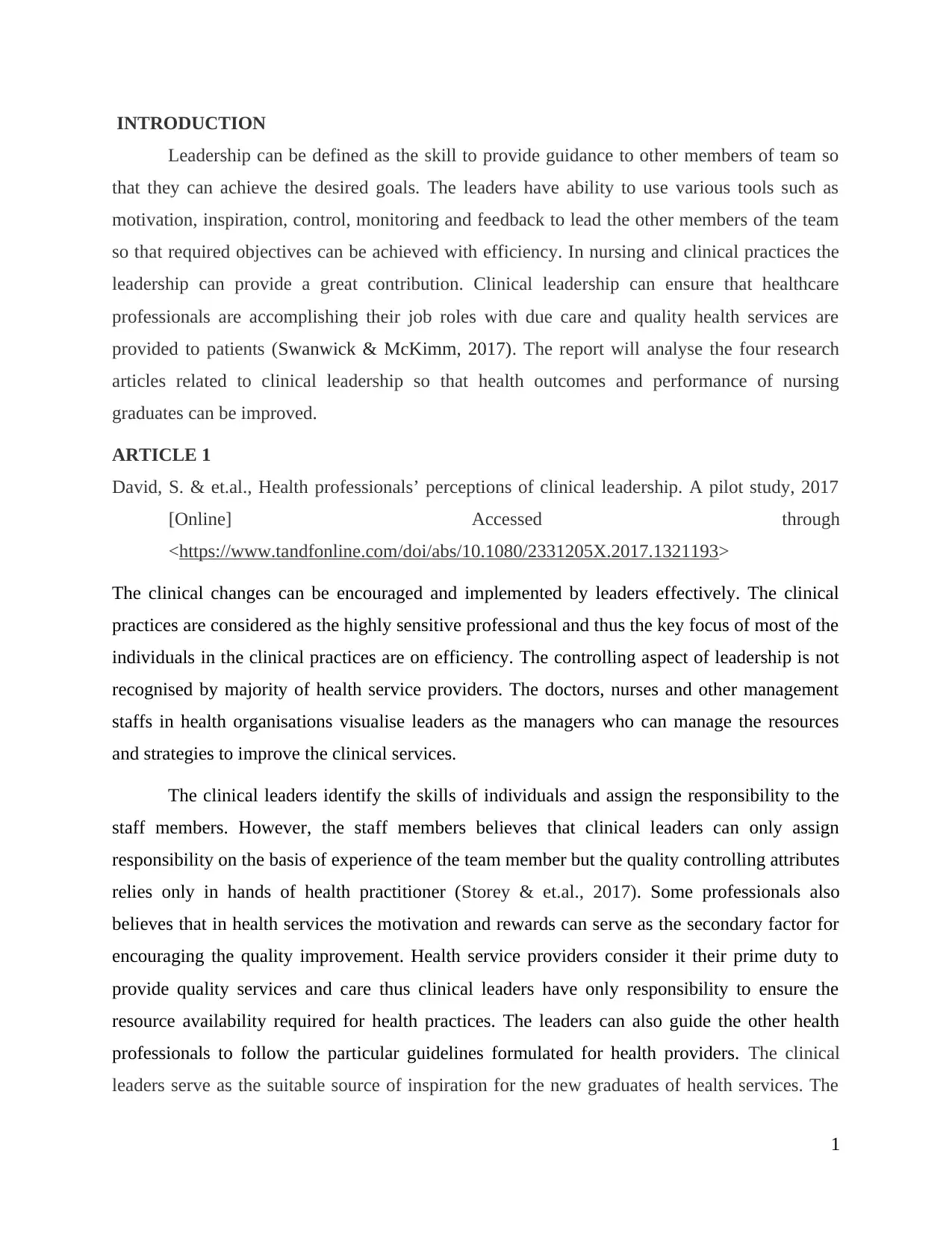
INTRODUCTION
Leadership can be defined as the skill to provide guidance to other members of team so
that they can achieve the desired goals. The leaders have ability to use various tools such as
motivation, inspiration, control, monitoring and feedback to lead the other members of the team
so that required objectives can be achieved with efficiency. In nursing and clinical practices the
leadership can provide a great contribution. Clinical leadership can ensure that healthcare
professionals are accomplishing their job roles with due care and quality health services are
provided to patients (Swanwick & McKimm, 2017). The report will analyse the four research
articles related to clinical leadership so that health outcomes and performance of nursing
graduates can be improved.
ARTICLE 1
David, S. & et.al., Health professionals’ perceptions of clinical leadership. A pilot study, 2017
[Online] Accessed through
<https://www.tandfonline.com/doi/abs/10.1080/2331205X.2017.1321193>
The clinical changes can be encouraged and implemented by leaders effectively. The clinical
practices are considered as the highly sensitive professional and thus the key focus of most of the
individuals in the clinical practices are on efficiency. The controlling aspect of leadership is not
recognised by majority of health service providers. The doctors, nurses and other management
staffs in health organisations visualise leaders as the managers who can manage the resources
and strategies to improve the clinical services.
The clinical leaders identify the skills of individuals and assign the responsibility to the
staff members. However, the staff members believes that clinical leaders can only assign
responsibility on the basis of experience of the team member but the quality controlling attributes
relies only in hands of health practitioner (Storey & et.al., 2017). Some professionals also
believes that in health services the motivation and rewards can serve as the secondary factor for
encouraging the quality improvement. Health service providers consider it their prime duty to
provide quality services and care thus clinical leaders have only responsibility to ensure the
resource availability required for health practices. The leaders can also guide the other health
professionals to follow the particular guidelines formulated for health providers. The clinical
leaders serve as the suitable source of inspiration for the new graduates of health services. The
1
Leadership can be defined as the skill to provide guidance to other members of team so
that they can achieve the desired goals. The leaders have ability to use various tools such as
motivation, inspiration, control, monitoring and feedback to lead the other members of the team
so that required objectives can be achieved with efficiency. In nursing and clinical practices the
leadership can provide a great contribution. Clinical leadership can ensure that healthcare
professionals are accomplishing their job roles with due care and quality health services are
provided to patients (Swanwick & McKimm, 2017). The report will analyse the four research
articles related to clinical leadership so that health outcomes and performance of nursing
graduates can be improved.
ARTICLE 1
David, S. & et.al., Health professionals’ perceptions of clinical leadership. A pilot study, 2017
[Online] Accessed through
<https://www.tandfonline.com/doi/abs/10.1080/2331205X.2017.1321193>
The clinical changes can be encouraged and implemented by leaders effectively. The clinical
practices are considered as the highly sensitive professional and thus the key focus of most of the
individuals in the clinical practices are on efficiency. The controlling aspect of leadership is not
recognised by majority of health service providers. The doctors, nurses and other management
staffs in health organisations visualise leaders as the managers who can manage the resources
and strategies to improve the clinical services.
The clinical leaders identify the skills of individuals and assign the responsibility to the
staff members. However, the staff members believes that clinical leaders can only assign
responsibility on the basis of experience of the team member but the quality controlling attributes
relies only in hands of health practitioner (Storey & et.al., 2017). Some professionals also
believes that in health services the motivation and rewards can serve as the secondary factor for
encouraging the quality improvement. Health service providers consider it their prime duty to
provide quality services and care thus clinical leaders have only responsibility to ensure the
resource availability required for health practices. The leaders can also guide the other health
professionals to follow the particular guidelines formulated for health providers. The clinical
leaders serve as the suitable source of inspiration for the new graduates of health services. The
1
⊘ This is a preview!⊘
Do you want full access?
Subscribe today to unlock all pages.

Trusted by 1+ million students worldwide
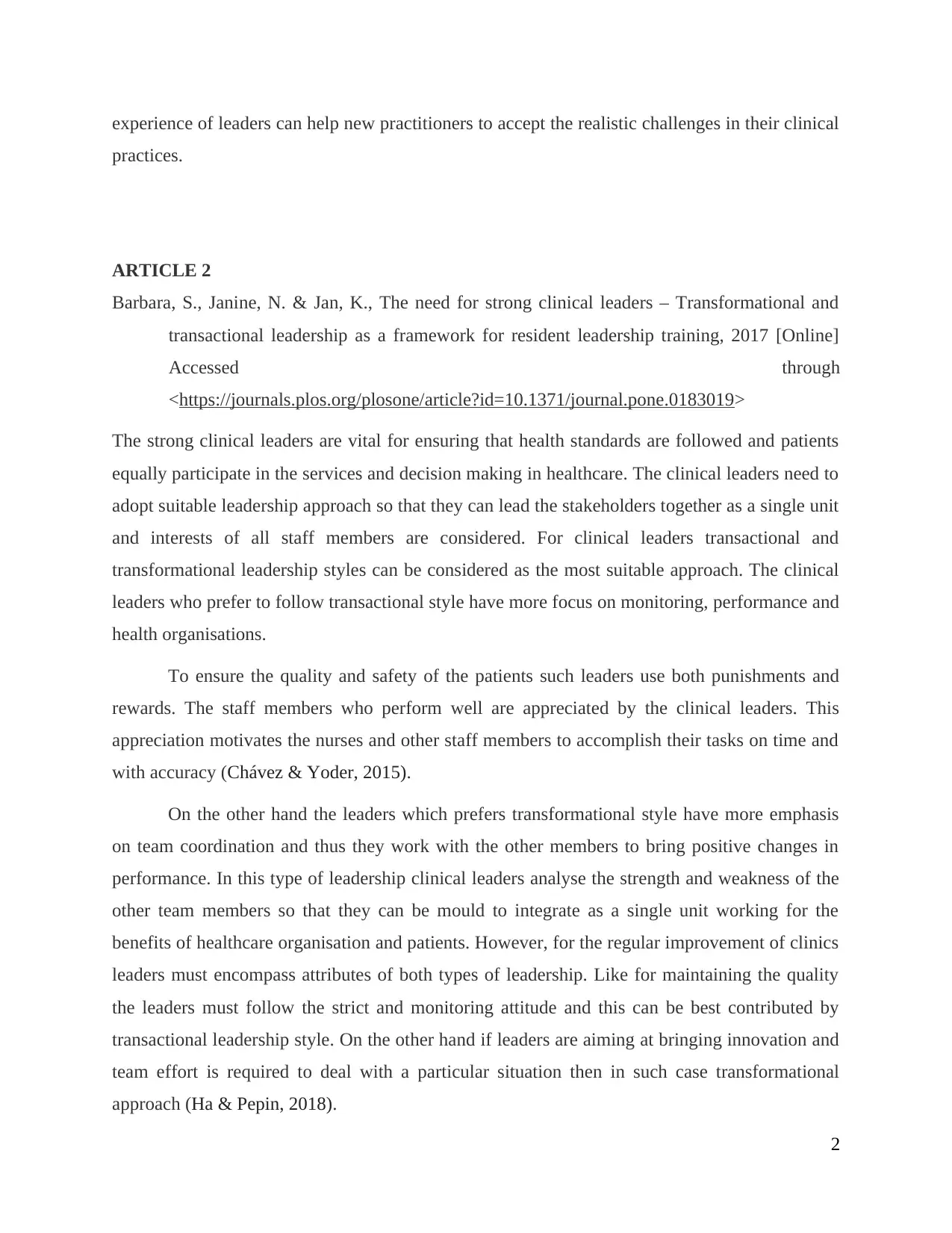
experience of leaders can help new practitioners to accept the realistic challenges in their clinical
practices.
ARTICLE 2
Barbara, S., Janine, N. & Jan, K., The need for strong clinical leaders – Transformational and
transactional leadership as a framework for resident leadership training, 2017 [Online]
Accessed through
<https://journals.plos.org/plosone/article?id=10.1371/journal.pone.0183019>
The strong clinical leaders are vital for ensuring that health standards are followed and patients
equally participate in the services and decision making in healthcare. The clinical leaders need to
adopt suitable leadership approach so that they can lead the stakeholders together as a single unit
and interests of all staff members are considered. For clinical leaders transactional and
transformational leadership styles can be considered as the most suitable approach. The clinical
leaders who prefer to follow transactional style have more focus on monitoring, performance and
health organisations.
To ensure the quality and safety of the patients such leaders use both punishments and
rewards. The staff members who perform well are appreciated by the clinical leaders. This
appreciation motivates the nurses and other staff members to accomplish their tasks on time and
with accuracy (Chávez & Yoder, 2015).
On the other hand the leaders which prefers transformational style have more emphasis
on team coordination and thus they work with the other members to bring positive changes in
performance. In this type of leadership clinical leaders analyse the strength and weakness of the
other team members so that they can be mould to integrate as a single unit working for the
benefits of healthcare organisation and patients. However, for the regular improvement of clinics
leaders must encompass attributes of both types of leadership. Like for maintaining the quality
the leaders must follow the strict and monitoring attitude and this can be best contributed by
transactional leadership style. On the other hand if leaders are aiming at bringing innovation and
team effort is required to deal with a particular situation then in such case transformational
approach (Ha & Pepin, 2018).
2
practices.
ARTICLE 2
Barbara, S., Janine, N. & Jan, K., The need for strong clinical leaders – Transformational and
transactional leadership as a framework for resident leadership training, 2017 [Online]
Accessed through
<https://journals.plos.org/plosone/article?id=10.1371/journal.pone.0183019>
The strong clinical leaders are vital for ensuring that health standards are followed and patients
equally participate in the services and decision making in healthcare. The clinical leaders need to
adopt suitable leadership approach so that they can lead the stakeholders together as a single unit
and interests of all staff members are considered. For clinical leaders transactional and
transformational leadership styles can be considered as the most suitable approach. The clinical
leaders who prefer to follow transactional style have more focus on monitoring, performance and
health organisations.
To ensure the quality and safety of the patients such leaders use both punishments and
rewards. The staff members who perform well are appreciated by the clinical leaders. This
appreciation motivates the nurses and other staff members to accomplish their tasks on time and
with accuracy (Chávez & Yoder, 2015).
On the other hand the leaders which prefers transformational style have more emphasis
on team coordination and thus they work with the other members to bring positive changes in
performance. In this type of leadership clinical leaders analyse the strength and weakness of the
other team members so that they can be mould to integrate as a single unit working for the
benefits of healthcare organisation and patients. However, for the regular improvement of clinics
leaders must encompass attributes of both types of leadership. Like for maintaining the quality
the leaders must follow the strict and monitoring attitude and this can be best contributed by
transactional leadership style. On the other hand if leaders are aiming at bringing innovation and
team effort is required to deal with a particular situation then in such case transformational
approach (Ha & Pepin, 2018).
2
Paraphrase This Document
Need a fresh take? Get an instant paraphrase of this document with our AI Paraphraser
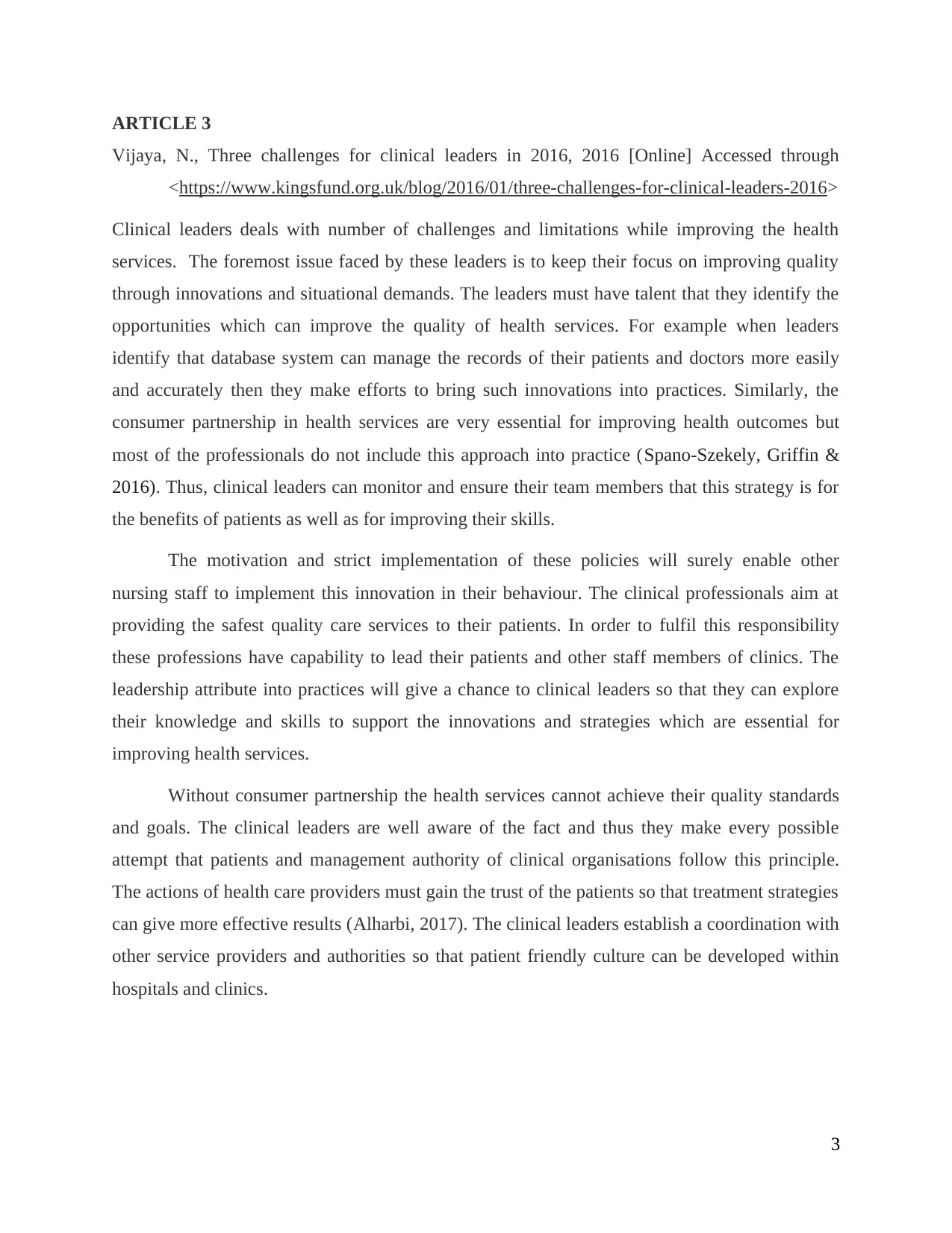
ARTICLE 3
Vijaya, N., Three challenges for clinical leaders in 2016, 2016 [Online] Accessed through
<https://www.kingsfund.org.uk/blog/2016/01/three-challenges-for-clinical-leaders-2016>
Clinical leaders deals with number of challenges and limitations while improving the health
services. The foremost issue faced by these leaders is to keep their focus on improving quality
through innovations and situational demands. The leaders must have talent that they identify the
opportunities which can improve the quality of health services. For example when leaders
identify that database system can manage the records of their patients and doctors more easily
and accurately then they make efforts to bring such innovations into practices. Similarly, the
consumer partnership in health services are very essential for improving health outcomes but
most of the professionals do not include this approach into practice (Spano-Szekely, Griffin &
2016). Thus, clinical leaders can monitor and ensure their team members that this strategy is for
the benefits of patients as well as for improving their skills.
The motivation and strict implementation of these policies will surely enable other
nursing staff to implement this innovation in their behaviour. The clinical professionals aim at
providing the safest quality care services to their patients. In order to fulfil this responsibility
these professions have capability to lead their patients and other staff members of clinics. The
leadership attribute into practices will give a chance to clinical leaders so that they can explore
their knowledge and skills to support the innovations and strategies which are essential for
improving health services.
Without consumer partnership the health services cannot achieve their quality standards
and goals. The clinical leaders are well aware of the fact and thus they make every possible
attempt that patients and management authority of clinical organisations follow this principle.
The actions of health care providers must gain the trust of the patients so that treatment strategies
can give more effective results (Alharbi, 2017). The clinical leaders establish a coordination with
other service providers and authorities so that patient friendly culture can be developed within
hospitals and clinics.
3
Vijaya, N., Three challenges for clinical leaders in 2016, 2016 [Online] Accessed through
<https://www.kingsfund.org.uk/blog/2016/01/three-challenges-for-clinical-leaders-2016>
Clinical leaders deals with number of challenges and limitations while improving the health
services. The foremost issue faced by these leaders is to keep their focus on improving quality
through innovations and situational demands. The leaders must have talent that they identify the
opportunities which can improve the quality of health services. For example when leaders
identify that database system can manage the records of their patients and doctors more easily
and accurately then they make efforts to bring such innovations into practices. Similarly, the
consumer partnership in health services are very essential for improving health outcomes but
most of the professionals do not include this approach into practice (Spano-Szekely, Griffin &
2016). Thus, clinical leaders can monitor and ensure their team members that this strategy is for
the benefits of patients as well as for improving their skills.
The motivation and strict implementation of these policies will surely enable other
nursing staff to implement this innovation in their behaviour. The clinical professionals aim at
providing the safest quality care services to their patients. In order to fulfil this responsibility
these professions have capability to lead their patients and other staff members of clinics. The
leadership attribute into practices will give a chance to clinical leaders so that they can explore
their knowledge and skills to support the innovations and strategies which are essential for
improving health services.
Without consumer partnership the health services cannot achieve their quality standards
and goals. The clinical leaders are well aware of the fact and thus they make every possible
attempt that patients and management authority of clinical organisations follow this principle.
The actions of health care providers must gain the trust of the patients so that treatment strategies
can give more effective results (Alharbi, 2017). The clinical leaders establish a coordination with
other service providers and authorities so that patient friendly culture can be developed within
hospitals and clinics.
3
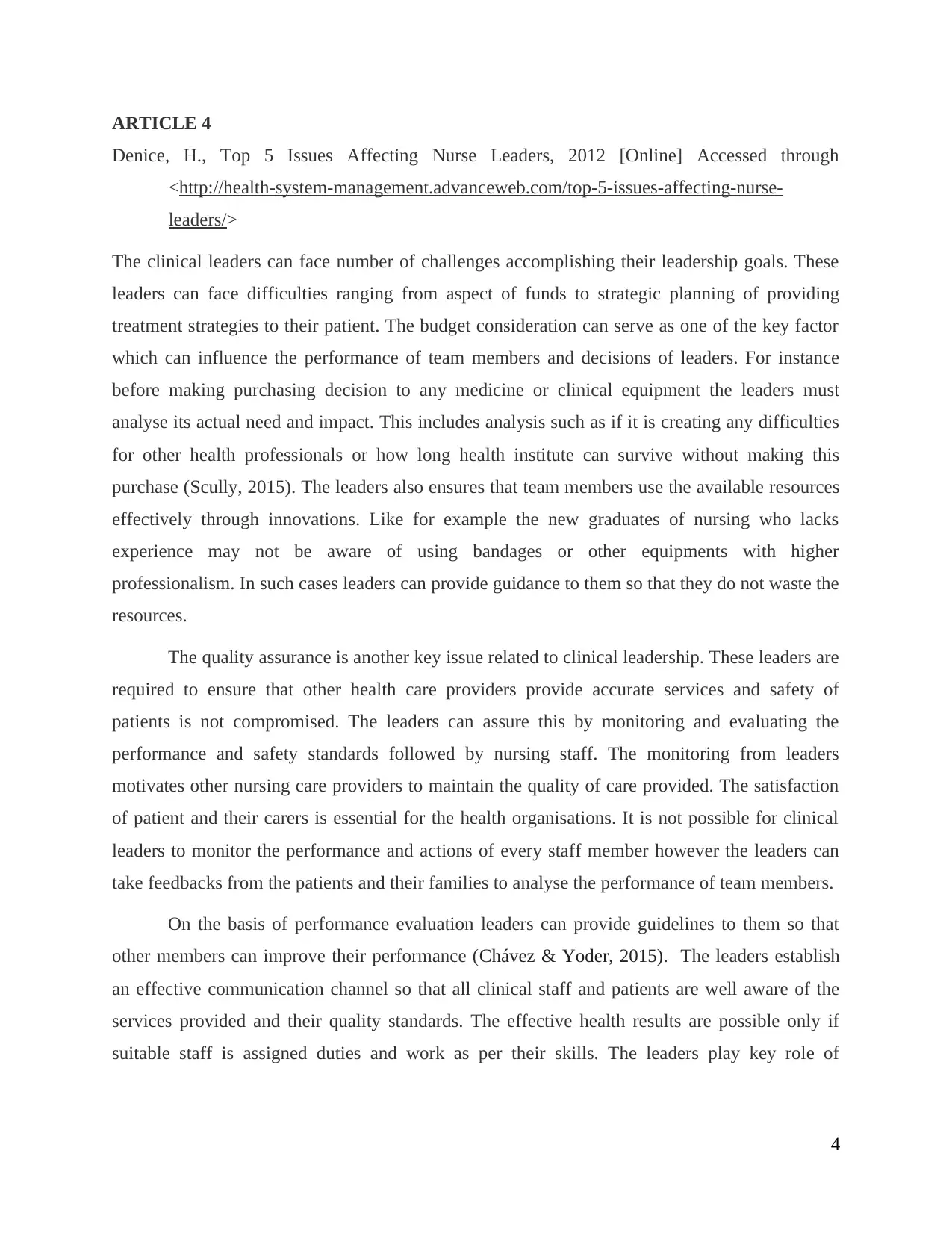
ARTICLE 4
Denice, H., Top 5 Issues Affecting Nurse Leaders, 2012 [Online] Accessed through
<http://health-system-management.advanceweb.com/top-5-issues-affecting-nurse-
leaders/>
The clinical leaders can face number of challenges accomplishing their leadership goals. These
leaders can face difficulties ranging from aspect of funds to strategic planning of providing
treatment strategies to their patient. The budget consideration can serve as one of the key factor
which can influence the performance of team members and decisions of leaders. For instance
before making purchasing decision to any medicine or clinical equipment the leaders must
analyse its actual need and impact. This includes analysis such as if it is creating any difficulties
for other health professionals or how long health institute can survive without making this
purchase (Scully, 2015). The leaders also ensures that team members use the available resources
effectively through innovations. Like for example the new graduates of nursing who lacks
experience may not be aware of using bandages or other equipments with higher
professionalism. In such cases leaders can provide guidance to them so that they do not waste the
resources.
The quality assurance is another key issue related to clinical leadership. These leaders are
required to ensure that other health care providers provide accurate services and safety of
patients is not compromised. The leaders can assure this by monitoring and evaluating the
performance and safety standards followed by nursing staff. The monitoring from leaders
motivates other nursing care providers to maintain the quality of care provided. The satisfaction
of patient and their carers is essential for the health organisations. It is not possible for clinical
leaders to monitor the performance and actions of every staff member however the leaders can
take feedbacks from the patients and their families to analyse the performance of team members.
On the basis of performance evaluation leaders can provide guidelines to them so that
other members can improve their performance (Chávez & Yoder, 2015). The leaders establish
an effective communication channel so that all clinical staff and patients are well aware of the
services provided and their quality standards. The effective health results are possible only if
suitable staff is assigned duties and work as per their skills. The leaders play key role of
4
Denice, H., Top 5 Issues Affecting Nurse Leaders, 2012 [Online] Accessed through
<http://health-system-management.advanceweb.com/top-5-issues-affecting-nurse-
leaders/>
The clinical leaders can face number of challenges accomplishing their leadership goals. These
leaders can face difficulties ranging from aspect of funds to strategic planning of providing
treatment strategies to their patient. The budget consideration can serve as one of the key factor
which can influence the performance of team members and decisions of leaders. For instance
before making purchasing decision to any medicine or clinical equipment the leaders must
analyse its actual need and impact. This includes analysis such as if it is creating any difficulties
for other health professionals or how long health institute can survive without making this
purchase (Scully, 2015). The leaders also ensures that team members use the available resources
effectively through innovations. Like for example the new graduates of nursing who lacks
experience may not be aware of using bandages or other equipments with higher
professionalism. In such cases leaders can provide guidance to them so that they do not waste the
resources.
The quality assurance is another key issue related to clinical leadership. These leaders are
required to ensure that other health care providers provide accurate services and safety of
patients is not compromised. The leaders can assure this by monitoring and evaluating the
performance and safety standards followed by nursing staff. The monitoring from leaders
motivates other nursing care providers to maintain the quality of care provided. The satisfaction
of patient and their carers is essential for the health organisations. It is not possible for clinical
leaders to monitor the performance and actions of every staff member however the leaders can
take feedbacks from the patients and their families to analyse the performance of team members.
On the basis of performance evaluation leaders can provide guidelines to them so that
other members can improve their performance (Chávez & Yoder, 2015). The leaders establish
an effective communication channel so that all clinical staff and patients are well aware of the
services provided and their quality standards. The effective health results are possible only if
suitable staff is assigned duties and work as per their skills. The leaders play key role of
4
⊘ This is a preview!⊘
Do you want full access?
Subscribe today to unlock all pages.

Trusted by 1+ million students worldwide
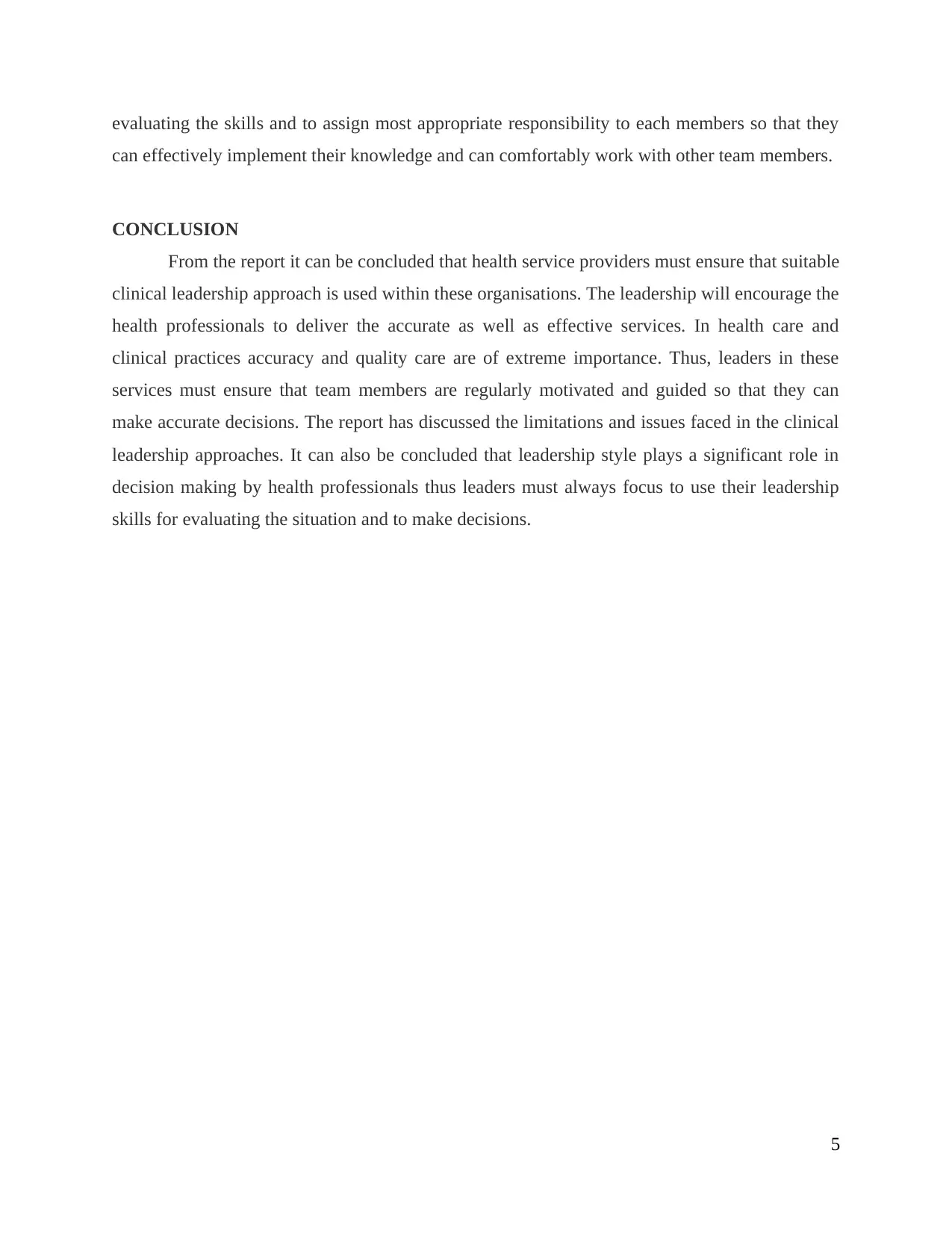
evaluating the skills and to assign most appropriate responsibility to each members so that they
can effectively implement their knowledge and can comfortably work with other team members.
CONCLUSION
From the report it can be concluded that health service providers must ensure that suitable
clinical leadership approach is used within these organisations. The leadership will encourage the
health professionals to deliver the accurate as well as effective services. In health care and
clinical practices accuracy and quality care are of extreme importance. Thus, leaders in these
services must ensure that team members are regularly motivated and guided so that they can
make accurate decisions. The report has discussed the limitations and issues faced in the clinical
leadership approaches. It can also be concluded that leadership style plays a significant role in
decision making by health professionals thus leaders must always focus to use their leadership
skills for evaluating the situation and to make decisions.
5
can effectively implement their knowledge and can comfortably work with other team members.
CONCLUSION
From the report it can be concluded that health service providers must ensure that suitable
clinical leadership approach is used within these organisations. The leadership will encourage the
health professionals to deliver the accurate as well as effective services. In health care and
clinical practices accuracy and quality care are of extreme importance. Thus, leaders in these
services must ensure that team members are regularly motivated and guided so that they can
make accurate decisions. The report has discussed the limitations and issues faced in the clinical
leadership approaches. It can also be concluded that leadership style plays a significant role in
decision making by health professionals thus leaders must always focus to use their leadership
skills for evaluating the situation and to make decisions.
5
Paraphrase This Document
Need a fresh take? Get an instant paraphrase of this document with our AI Paraphraser
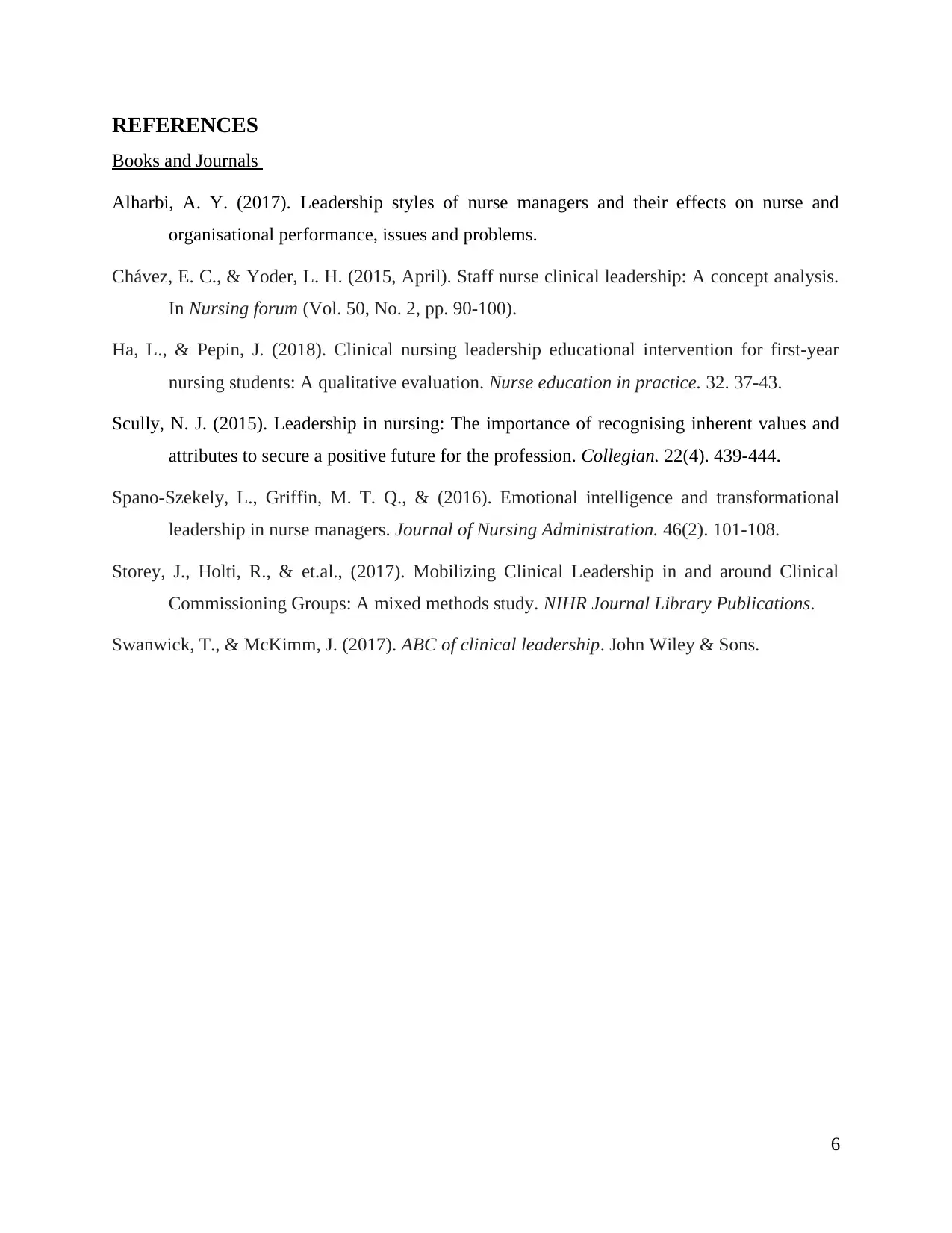
REFERENCES
Books and Journals
Alharbi, A. Y. (2017). Leadership styles of nurse managers and their effects on nurse and
organisational performance, issues and problems.
Chávez, E. C., & Yoder, L. H. (2015, April). Staff nurse clinical leadership: A concept analysis.
In Nursing forum (Vol. 50, No. 2, pp. 90-100).
Ha, L., & Pepin, J. (2018). Clinical nursing leadership educational intervention for first-year
nursing students: A qualitative evaluation. Nurse education in practice. 32. 37-43.
Scully, N. J. (2015). Leadership in nursing: The importance of recognising inherent values and
attributes to secure a positive future for the profession. Collegian. 22(4). 439-444.
Spano-Szekely, L., Griffin, M. T. Q., & (2016). Emotional intelligence and transformational
leadership in nurse managers. Journal of Nursing Administration. 46(2). 101-108.
Storey, J., Holti, R., & et.al., (2017). Mobilizing Clinical Leadership in and around Clinical
Commissioning Groups: A mixed methods study. NIHR Journal Library Publications.
Swanwick, T., & McKimm, J. (2017). ABC of clinical leadership. John Wiley & Sons.
6
Books and Journals
Alharbi, A. Y. (2017). Leadership styles of nurse managers and their effects on nurse and
organisational performance, issues and problems.
Chávez, E. C., & Yoder, L. H. (2015, April). Staff nurse clinical leadership: A concept analysis.
In Nursing forum (Vol. 50, No. 2, pp. 90-100).
Ha, L., & Pepin, J. (2018). Clinical nursing leadership educational intervention for first-year
nursing students: A qualitative evaluation. Nurse education in practice. 32. 37-43.
Scully, N. J. (2015). Leadership in nursing: The importance of recognising inherent values and
attributes to secure a positive future for the profession. Collegian. 22(4). 439-444.
Spano-Szekely, L., Griffin, M. T. Q., & (2016). Emotional intelligence and transformational
leadership in nurse managers. Journal of Nursing Administration. 46(2). 101-108.
Storey, J., Holti, R., & et.al., (2017). Mobilizing Clinical Leadership in and around Clinical
Commissioning Groups: A mixed methods study. NIHR Journal Library Publications.
Swanwick, T., & McKimm, J. (2017). ABC of clinical leadership. John Wiley & Sons.
6
1 out of 8
Related Documents
Your All-in-One AI-Powered Toolkit for Academic Success.
+13062052269
info@desklib.com
Available 24*7 on WhatsApp / Email
![[object Object]](/_next/static/media/star-bottom.7253800d.svg)
Unlock your academic potential
Copyright © 2020–2026 A2Z Services. All Rights Reserved. Developed and managed by ZUCOL.





